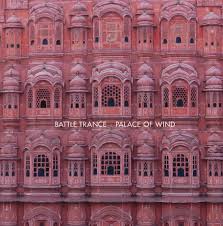Though far from being as widely loathed as, say, bagpipes, the saxophone remains a divisive instrument in many circles. A little over a dozen years ago, when I was still struggling to find the gnarliest squall on the market (no mean feat in Kalamazoo, Michigan before the advent of YouTube and its contemporaries), I had an older friend who would help me navigate the waters. This was the man who turned me on to Wolf Eyes, Bulb Records, Faust, The Electric Eels, and who knows what else, and this guy fucking hated just about anything with saxophones. "Clarence Clemons bullshit", I believe he called it.
I didn’t fully agree then, and my sentiments are even further removed now (to be fair, I think his are too, though I haven’t checked in lately). Still, I can’t help but wonder what he would think of Battle Trance’s new album Palace Of Wind. The band consists of four tenor saxophonists (Travis Laplante, Matthew Nelson, Jeremy Viner, and Patrick Breiner) and nothing else, but their sound is a far cry from "Clarence Clemons bullshit": utilising circular breathing and other extended techniques, Battle Trance create massive, undulating waves of sound which have relatively few clear precedents. Struggling for a pocket description, I’ve told people that they call to mind Borbetomagus performing the works of Terry Riley (upon closer inspection, Philip Glass may be more apt, and I should probably mention Donald Scavarda’s groundbreaking work with multiphonics as an overt precedent), but even that’s a reach.
Lest you expect anything free-floating or meandering, though, rest assured: Palace Of Wind is pointed, extremely focused music. The album-length title piece (divided into three tracks) was through-composed by Laplante; it was learned in rehearsals which were akin to martial arts training, with the group going through endless repetitions of figures and techniques which could not be described in traditional notation. The results can seem like a clangorous blur at first, but deeper listening reveals remarkable technique and restraint to temper (but not diminish) the music’s primordial oomph.
The album starts off almost placid, but that proves deceiving: the opening salvo of the first track quickly becomes a relentless onslaught, with anything close to a break still well-buttressed by heavy skronk. Many people will be quick to call this free jazz, but aside from not actually being "free" I would contend that it is not "jazz", but a carefully premeditated exorcism.
The second movement marks a more austere and cinematic turn, with moments of Feldman-esque space to counter the unmitigated sound-wall of its predecessor. If there’s anything on Palace Of Wind to play for your mother, this might be it: though it too careens into dissonance, it at least eases you in (NOTE: these maternal standards go out the window if your mother is Laurie Anderson).
The third movement is the longest, and it seems to utilise the widest range of extended techniques (though I didn’t necessarily keep count): starting with long, seasick drones, it proceeds to careen from funereal doom to rich, Ayler-esque celebration with abandon. The sound here is several horse lengths closer to jazz than any other section of the piece, but it’s a jazz which descends into a swarm of locusts before collapsing in exhaustion.
There is a certain "high-art" loftiness surrounding Battle Trance’s music which invites skepticism from those who prefer their blurt at street level (c/f my aforementioned friend), and their uncompromising sound might also make them a hard sell to the stodgy geezers on the (purportedly) opposite side of the aural canyon. Yet, Palace Of Wind‘s best moments blow a clean path across that brambly divide, inviting any takers to jump in deep, Clarence Clemons bullshit be damned.
<div class="fb-comments" data-href="http://thequietus.com/articles/16367-battle-trance-palace-of-wind-review” data-width="550">


